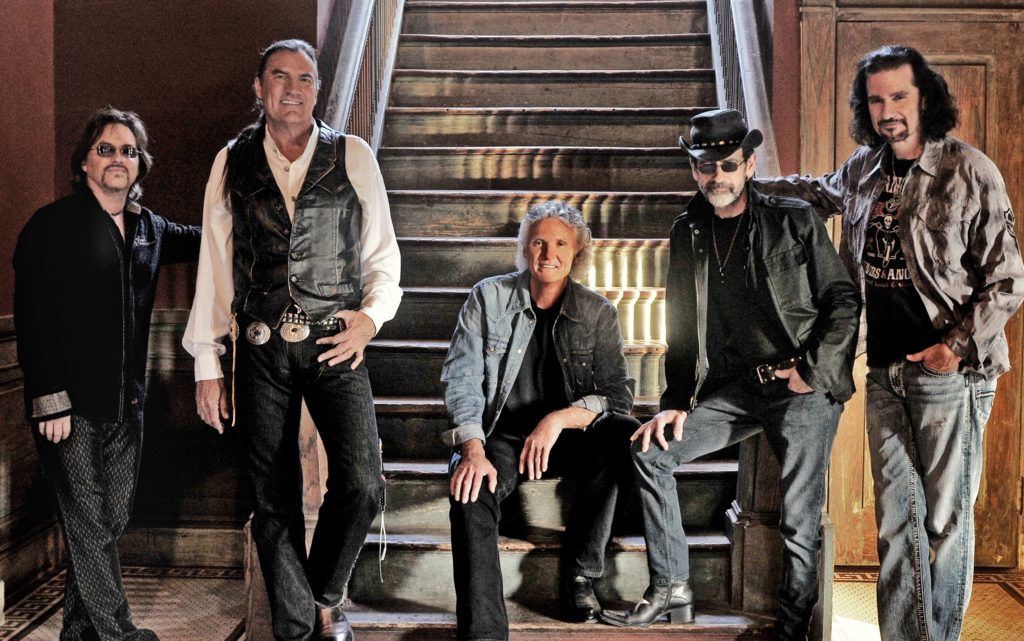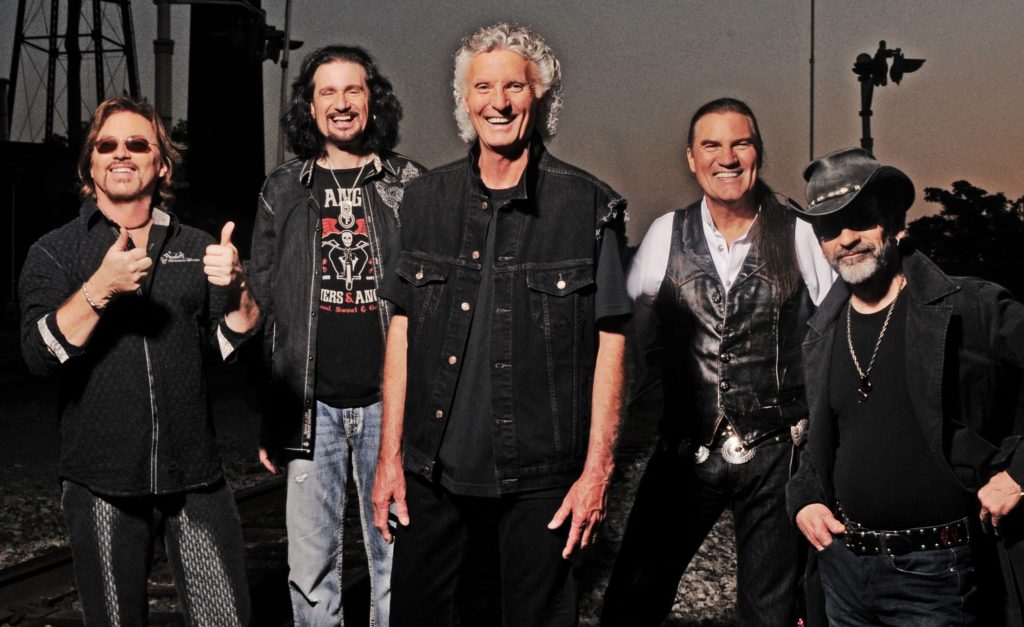
Sixteen years after reforming, it appears that legendary American rock band Grand Funk Railroad is as popular as it’s ever been.
The band, formed in the shadow of the massive auto plants of Flint, Michigan, is best known for staple rock radio hits such as We’re An American Band, Walk Like A Man, Shinin’ On, Bad Time, Some Kind of Wonderful and their funked-up version of Little Eva’s hit, The Locomotion. And with a pedigree of classic songs appealing to multiple generations of rock music fans, Grand Funk Railroad continues to be a popular draw on the North American concert circuit, including playing a date at Fallsview Casino in Niagara Falls on Saturday, April 30.
“We’re already up to doing 40 shows this year. We usually do between 35 and 40 but we’re already booked for 40 and I know there are more offers coming in. So we’re definitely going to beat the record for most shows since we got back together,” said drummer/vocalist Don Brewer, from his home in Jupiter, Florida.
“And I think we’re getting busier because our audience is getting bigger and more diverse. There’s always a really good cross section of ages and I think those younger people are coming because they have heard the name or they know a couple of songs and are kind of curious. So that’s great. When you play a lot of outdoor fairs and festivals to a general audience, we see sometimes two or three generations of fans, from grandparents down to grandkids – and they all know the words.”
Brewer believes that there are a significant and growing number of young music lovers who are craving real, soulful, honest, authentic rock and roll and are not afraid to seek it out.
“When I was coming up and when most of us were coming up, that’s what we did. We checked out everybody that came before what was popular at the time. That’s how we found out about all the Blues greats and Elvis Presley and all those great legends. When you get into music when you’re in your teens, I think it’s natural to want to explore what came before the hits on the radio. I see a lot of kids playing albums by Cream and Jimi Hendrix and people like that, because it’s great music and it’s being played well, and something about it speaks to them, just like it did when I was their age. And then when they come to see bands like ours live, they can’t believe they’re seeing 60-year-old guys up there who are rocking out better than the bands on the radio today,” he said, adding that he is heartened to see so many young people embracing vinyl as their source for music.
“I can hear the difference between vinyl and something that is digital, especially an Mp3. But to me, it’s not about all the technology that goes into a record or how perfect it sounds. To me, if the song is good and the performance is good, and really authentic, that’s what I care about. If you go back and listen to stuff from the 1930s and 1940s, even into the 1950s – there are absolutely no overdubs and everybody is playing live in the studio to only a couple of microphones. I don’t care about the sound, but the quality of the song and the greatness of the performance and whether it touches me or not.
“I think the younger kids realize that if you get a really good sound system that is capable of producing the sound from the vinyl record that it was meant to produce, there’s no doubt that they will prefer that way – if they really care about the music. But most people are listening through cheap ear buds through their iPod, or they’re in their bedroom with a couple of teeny tiny speakers. And I think those people are missing out, because they don’t value music like we did. It was an experience to buy and listen to a new album. You felt like you were in the room with the band when you played that record. But so many people see music as disposable. They will download a song, listen to it a handful of times and that’s it – bye bye, that’s all they want. It’s like candy.”
Brewer also said he and his bandmates are grateful whenever other, more modern bands, cover Grand Funk Railroad tunes, citing Poison’s 19** cover of We’re An American Band, and more recently Rob Zombie’s incendiary cover of the same song in 2014.
“Whenever audiences hear somebody cover a song, whether it’s Poison or Rob Zombie, they will immediately wonder where that song came from. They will investigate it and realize that it’s probably a song that they’ve heard hundreds of times on the radio when they were growing up but didn’t realize where it origination,” he said.
“I think it’s amazing that the song We’re An American Band has this kind of life. I remember when I finished the song and we recorded it down in Miami at Criteria Studios and were playing it back for some of the folks at Capitol Records and they were all just jumping up and down. And I went, ‘man, do you really like that?’ Honestly, when you write something or create something, you really don’t know the kind of effect that it’s going to have on people. So it’s surprising to me still that our songs have really lasted as long as they have.”
A co-founder along with bassist Mel Schacher and guitarist/singer Mark Farmer of Grand Funk Railroad in 1969, Brewer has been the lone mainstay in every incarnation of the band, although Schacher has been present for most of that time, including being part of the 2000 reformation.
“It’s been quite a journey and we have quite an unspoken brotherhood. We have been through all these situations together and it was often just us. We know what we went through at the time and how we went through it and came out the other side, still basically holding on to one another. We know we’ve got each other’s back,” Brewer said.
“Where it’s been dealing with [the band’s first manager] Terry Knight, dealing with crooked attorneys, dealing with the IRS and the Mark Farner situation, all of that stuff goes into your history and your love for each other. It’s been a roller coast for sure and nobody else has experienced those ups and downs the same way that Mel and I have experienced them in Grand Funk.”
Since getting back together at the turn of the millennium, Grand Funk’s founding duo has been accompanied onstage by a trio of seasoned, and eminently talented musicians to round out the line-up: Former longtime Kiss axe slinger Bruce Kulick, former 38 Special singer Max Carl and veteran Bob Seger keyboardist Tim Cashion.
“We have been really lucky to pick some terrific guys and they have been through all the crap we have through over the past 17 years. And here we are, having the best year that we’ve had for 16 years. They are a tremendous bunch of guys. I knew Bruce back before Kiss when he was playing with Michael Bolton and I was playing with Bob Seger. Bolton was the opening act for Seger and that’s where I first saw him play. I realized right away that he was not just a heavy metal guy. He can play R&B and jazz and all kinds of rock. He’s a very gifted and talented guitar player, and just a great guy,” Brewer explained.
“Max Carl was with 38 Special and Jack Mack and the Heart Attack and is a great frontman and probably one of the last blue-eyed soul singers on the planet, which is perfect for Grand Funk because that’s what we are – we’ve got this R&B thing that we carry along with us that infuses everything we do. And it takes a certain kind of guy to have that mentality and the ability to make the rock and R&B combination work. Max is that guy.
“Tim Cashion has been with Robert Palmer and Bob Seger and so many other people is, again, a great musician, a great singer and a great guy. We all spend a lot of time together in cars and vans, and have done so for the past 16 or 17 years, and we don’t have any problems. It just works, and Mel and I couldn’t be happier.”
And not content to be seen as strictly a nostalgia act, Brewer said the current lineup of Grand Funk Railroad has been writing and recording new material for many years, with a couple of new songs usually popping up in every set list. But he feels the current state of the music industry precludes any of that material seeing the light of the day, at least for the foreseeable future.
“We have lots of new material in the can. And I suppose at some time, if it becomes relevant again, we may put something out that contains some of the new, some of the old – that kind of thing. We haven’t got there yet. I see too many classic bands like us struggling to put out new music. It doesn’t get any airplay or much attention from the press. They spend all that time and money and put their heart and soul into stuff and nobody seems to give a crap. I have seen it happen to so many people and it’s disheartening,” he said.
“And we’re not going to re-record our old songs with the new lineup. I hate when people do that. I don’t think that’s the way to go. Let the original songs stand as they were recorded. People remember them that way, so that’s the way they should stay.”
* Jim Barber is a veteran award-winning journalist and author based in Napanee, ON, who has been writing about music and musicians for a quarter of a century. Besides his journalistic endeavours, he now works as a communications and marketing specialist. Contact him at jimbarberwritingservices@gmail.com.

